‘Elvis: A Musical Revolution’ chronicles the King’s many triumphs and travails
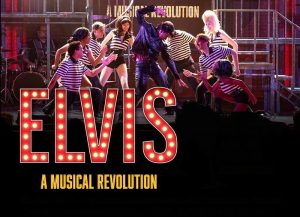 Elvis: A Musical Revolution comes to the Broadway Palm main stage December 30 and runs through February 17. While the bio-musical features some forty numbers from Presley’s storied catalog, it also chronicles his triumphs and travails and pervasive influence on American music – and the bands emerging in the late ‘50s and ‘60s across the proverbial pond.
Elvis: A Musical Revolution comes to the Broadway Palm main stage December 30 and runs through February 17. While the bio-musical features some forty numbers from Presley’s storied catalog, it also chronicles his triumphs and travails and pervasive influence on American music – and the bands emerging in the late ‘50s and ‘60s across the proverbial pond.
While  the musical identifies the gospel traditions that influenced Presley (such as Johnathon Lee’s moving rendition of “This Train Is Bound for Glory”), it more importantly reminds audiences of Presley’s groundbreaking
the musical identifies the gospel traditions that influenced Presley (such as Johnathon Lee’s moving rendition of “This Train Is Bound for Glory”), it more importantly reminds audiences of Presley’s groundbreaking 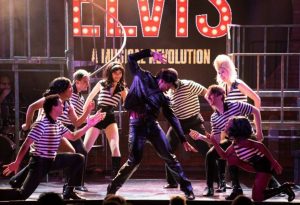 appearance on Frank Sinatra’s Timex Special on ABC. At the time, Presley had been out of the public eye for nearly three years. During the latter two, he was stationed in West Germany after entering military service in 1958.
appearance on Frank Sinatra’s Timex Special on ABC. At the time, Presley had been out of the public eye for nearly three years. During the latter two, he was stationed in West Germany after entering military service in 1958.
In Elvis For Dummies, author Susan Doll writes “Appearing with 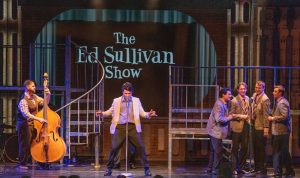 Sinatra suggested that Elvis was following the same career path [as Sinatra] and was therefore the natural heir to the Voice.” She also points out that Presley’s singing style and appearance on the show “clearly signaled that Elvis was courting a mainstream, adult audience” in an intentional effort to insulate himself from fickle audiences
Sinatra suggested that Elvis was following the same career path [as Sinatra] and was therefore the natural heir to the Voice.” She also points out that Presley’s singing style and appearance on the show “clearly signaled that Elvis was courting a mainstream, adult audience” in an intentional effort to insulate himself from fickle audiences 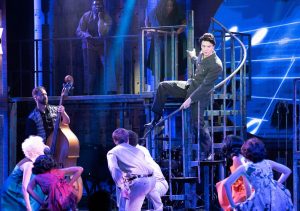 who would predictably gravitate to the next rock n’ roll phenom.
who would predictably gravitate to the next rock n’ roll phenom.
On the special, Elvis performed “Stuck on You” and “Fame and Fortune,” the A and B sides of his first post-Army single on RCA Victor. But he also performed a duet with the King of Cool, with Elvis singing Sinatra’s pulsating 1957 Cy Coleman chart hit “Witchcraft” and Sinatra crooning the 1956 Elvis classic 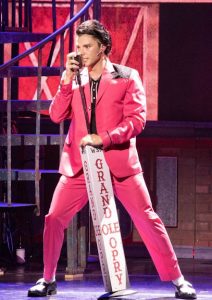 “Love Me Tender.” These performances were finally released on record in the ‘80s, and the duet is dramatically recreated in Elvis: A Musical Revolution. Interestingly, Presley received a less-than-enthusiastic critical response to his part of the duet, which metaphorically mirrors the American public’s hot-and-cold reception to Presley’s music and swiveling hips.
“Love Me Tender.” These performances were finally released on record in the ‘80s, and the duet is dramatically recreated in Elvis: A Musical Revolution. Interestingly, Presley received a less-than-enthusiastic critical response to his part of the duet, which metaphorically mirrors the American public’s hot-and-cold reception to Presley’s music and swiveling hips.
No portrayals of the King’s life and times would be complete (or accurate) without detailing his relationship with his manager, Colonel Tom Parker, who frequently frustrated Presley by committing him to star in mediocre films. Nevertheless, scenes from these very movies, like “Harem Scarem,” “Viva Las Vegas” 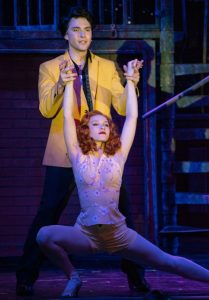 and “Jailhouse Rock,” provide the show with a Broadway feel, complete with choreographed costumed dancers. In fact, the bio-musical does an admirable job of illustrating just how Elvis’ personal magnetism overcame the limitations of the uninspired filmmaking to which he was subjected by his manager’s lust for fortune, if not fame.
and “Jailhouse Rock,” provide the show with a Broadway feel, complete with choreographed costumed dancers. In fact, the bio-musical does an admirable job of illustrating just how Elvis’ personal magnetism overcame the limitations of the uninspired filmmaking to which he was subjected by his manager’s lust for fortune, if not fame.
With the songs often arranged differently from Presley’s original recordings, the music in Elvis: A Musical Revolution is refreshingly new and vibrant, “sometimes providing additional insight into the development of the unique sound of the man once styled as the King of Rock and Roll,” writes theater critic Mark Dreisonstokon.
The  show contains vignettes from Elvis’ early recording sessions at Sun Records, appearance at the Grand Old Opry and appearance on The Milton Berle Show. And audiences will thrill to such iconic songs as “All Shook Up,” “Heartbreak Hotel,” “Burning Love,” “Hound Dog,” “Don’t Be Cruel,” “Jailhouse Rock,” “Blue Suede Shoes,” “That’s All Right,” “Are You Lonesome Tonight” and Can’t Help Falling in Love with You.”
show contains vignettes from Elvis’ early recording sessions at Sun Records, appearance at the Grand Old Opry and appearance on The Milton Berle Show. And audiences will thrill to such iconic songs as “All Shook Up,” “Heartbreak Hotel,” “Burning Love,” “Hound Dog,” “Don’t Be Cruel,” “Jailhouse Rock,” “Blue Suede Shoes,” “That’s All Right,” “Are You Lonesome Tonight” and Can’t Help Falling in Love with You.”
“Elvis: A Musical Revolution showcases Elvis’s revolution of American popular music and snapshots of a bygone era of American culture,” concludes reviewer Mark Dreisonstokon, commenting on the Dutch Apple version of the bio-musical. “Most of all, it depicts why and how Elvis captured the hearts of his vast audience. In the words of one audience member, ‘I fell in love with Elvis all over again!’”
You will too.
December 28, 2023.














 Tom Hall is both an amateur artist and aspiring novelist who writes art quest thrillers. He is in the final stages of completing his debut novel titled "Art Detective," a story that fictionalizes the discovery of the fabled billion-dollar Impressionist collection of Parisian art dealer Josse Bernheim-Jeune, thought by many to have perished during World War II when the collection's hiding place, Castle de Rastignac in southern France, was destroyed by the Wehrmacht in reprisal for attacks made by members of the Resistance operating in the area. A former tax attorney, Tom holds a bachelor's degree as well as both a juris doctorate and masters of laws in taxation from the University of Florida. Tom lives in Estero, Florida with his fiancee, Connie, and their four cats.
Tom Hall is both an amateur artist and aspiring novelist who writes art quest thrillers. He is in the final stages of completing his debut novel titled "Art Detective," a story that fictionalizes the discovery of the fabled billion-dollar Impressionist collection of Parisian art dealer Josse Bernheim-Jeune, thought by many to have perished during World War II when the collection's hiding place, Castle de Rastignac in southern France, was destroyed by the Wehrmacht in reprisal for attacks made by members of the Resistance operating in the area. A former tax attorney, Tom holds a bachelor's degree as well as both a juris doctorate and masters of laws in taxation from the University of Florida. Tom lives in Estero, Florida with his fiancee, Connie, and their four cats.